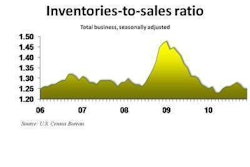In response to concerns from independent truckers, Legislation was introduced to the U.S. House of Representatives on Thursday, Feb. 17, that would protect drivers and improve the productivity and safety of moving goods by truck. H.R. 756 directs the U.S. Department of Transportation to study the amount of time truck drivers are forced to sit and wait at loading docks and to use those study results to establish a maximum number of hours that drivers may be detained without being compensated.
“Over the years I’ve heard anecdotes from truck drivers that detention time is a big problem and contributes significantly to inefficiencies in the supply chain productivity,” says U.S. Rep. Peter DeFazio (D-Ore.), who introduced the legislation. “I asked GAO to study detention time and quantify the results. It’s clear from the report that detaining truckers at loading docks is a significant problem that FMCSA needs to regulate.”
DeFazio’s legislation would require USDOT to study detention time and issue regulations on the maximum number of hours that a driver may be reasonably detained without compensation. The legislation would require shippers and receivers to pay a detention fee for detention of drivers beyond the time established by USDOT and authorize civil penalties against shippers for failure to pay for unreasonable detention time.
As the former chairman of the House Subcommittee on Highways and Transit, DeFazio held several hearings where he heard from independent truck drivers about the time and productivity lost by drivers who are detained at loading docks. Often, drivers said they are forced to wait hours before a shipment is ready for pickup or unloading, costing them valuable time and money. A 2009 study conducted by the Federal Motor Carrier Safety Administration identified waiting for loading and unloading as a major inefficiency in the industry, costing carriers over $3 billion dollars annually.
DeFazio requested a Government Accountability Office study of the impact detention time has on truck drivers and potential violations of federal hours-of-service requirements. The GAO issued a final report titled “Commercial Motor Carriers: More Could Be Done to Determine Impact of Excessive Loading and Unloading Wait Times on Hours-of-Service Violations,” which found detention time to be a serious issue threatening the motor carrier industry. Through driver interviews, GAO found that detention time affects drivers’ ability to make a living, has an impact on hours-of-service and adversely affects independent drivers more so than drivers employed by large carriers.
Among GAO’s findings:
• Detention of drivers at shipper or receiver facilities is a prevalent problem: of more than 300 drivers interviewed by GAO, 68 percent reported being detained within the past month;
• 80 percent of drivers that had experienced detention time reported that being detained impacted their ability to meet hours-of-service requirements;
• 65 percent of drivers reported lost revenue due to being detained;
• Shippers and receivers control many factors that lead to driver detention, such as facility staffing, lack of loading or unloading equipment, poor service and products not ready for pick up;
• Shippers often disagree with carriers and drivers about the amount of detention time, and some motor carriers choose not to collect detention fees from their customers; and
• FMCSA does not collect data related to the cause for hours-of-service violations when such violations are discovered in roadside inspections or compliance reviews.
DeFazio says that under current law, shippers and receivers are not held accountable for the roles they play in affecting motor carrier safety, and that drivers in the trucking industry are not protected by basic wage and hour laws; instead, hours-of-service rules are in place to regulate maximum time on the job.
Many drivers are paid by the mile or by the load, rather than by the hour, and therefore are impacted by inefficiencies and congestion, DeFazio says. Without addressing detention time, hours-of-service rules do nothing to ensure a driver can make a living even when working a full day, so if a driver is detained beyond a certain period of time, the driver should be compensated, he says.











